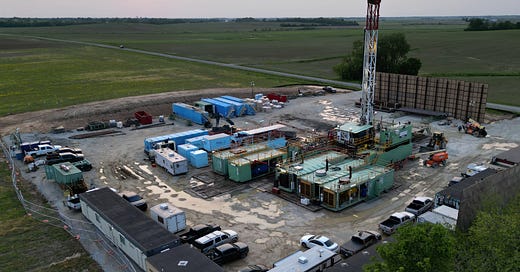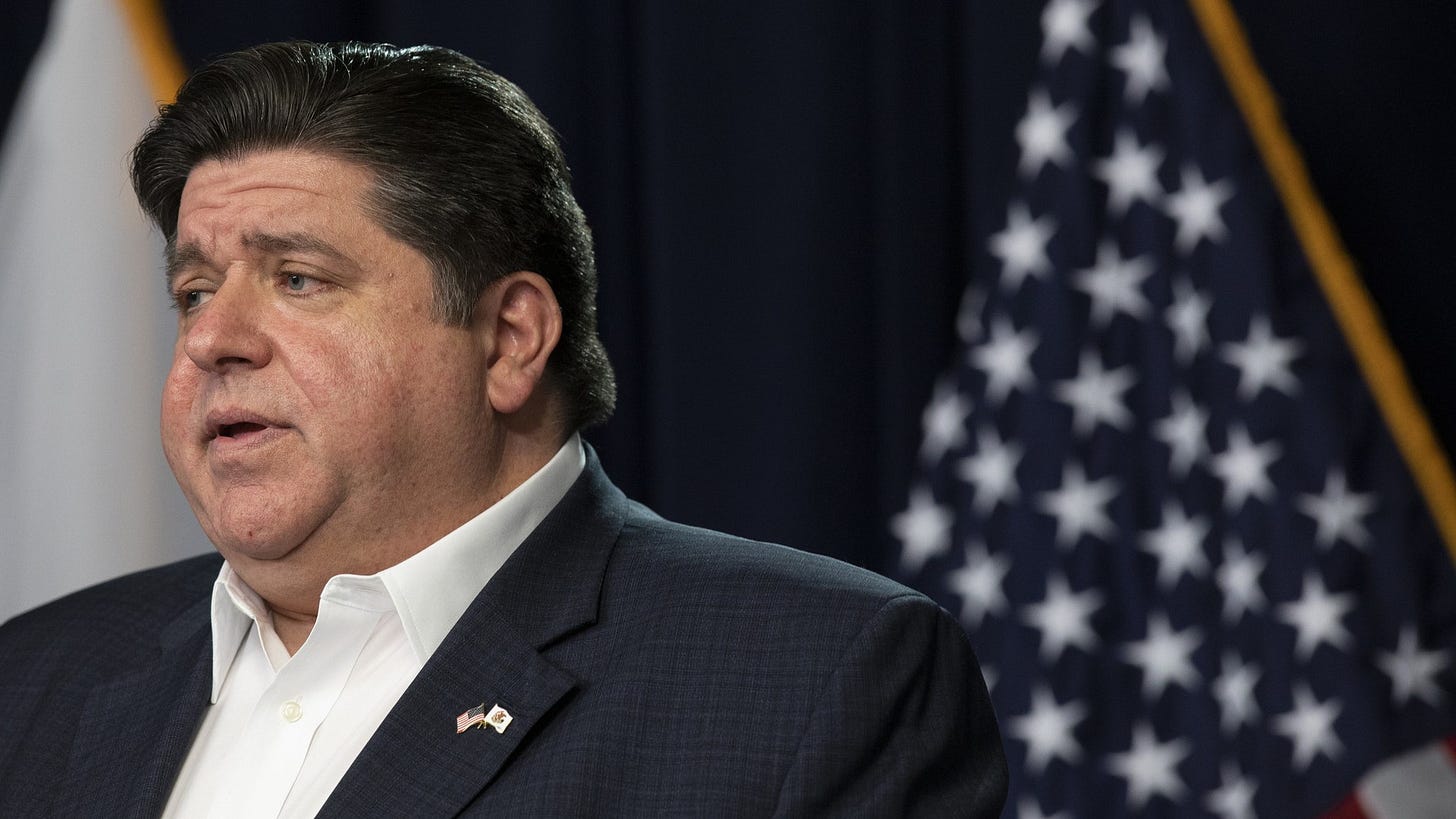THE ILLINOIZE: Monday Free for All...CO2 and storage...Pritzker and jobs...Climate and farmers
July 24, 2023
Good morning, Illinois.
It’s going to be busy…and hot…this week. I need a cold plunge or something.
The legislature is (still) out until October. Gov. Pritzker has nothing on his public schedule.
We’re churning out lots of great stuff for paid subscribers. I hope you will join us to get all of our content. We’ll give you 30 days free if you check it out now!
Let’s get to it.
YOUR MONDAY FREE FOR ALL
(note: we’re not responsible for paywalls and restrictions from other news outlets, because good journalism isn’t free)
Push to build more CO2 pipelines and store vast amounts of the gas underground in Illinois raises alarms about safety regulations (Chicago Tribune)
For years, the carbon dioxide pipeline snaked through the fields and forests of Yazoo County, Mississippi, going largely unnoticed.
But that changed forever on a winter evening in 2020.
Under pressure from heavy rains and a landslide, the pipeline split in two, roaring like a jet engine, carving a 40-foot crater into the ground, and sending an invisible cloud of dangerous carbon dioxide vapor toward the tiny village of Satartia.
In a scene rescue workers would later compare to a zombie movie, cars died in the middle of the road, their engines starved of oxygen. Drivers fled, leaving their hazard lights blinking in the dust and darkness.
While rare and up until now nonfatal, accidents such as the one that night in Satartia loom large as the Midwest considers the health and safety issues raised by proposals to build massive new carbon dioxide pipeline projects, including Omaha-based Navigator CO2′s 1,350-mile network spanning Illinois, Iowa, Minnesota, Nebraska and South Dakota.
The projects aim to prevent planet-warming CO2 from entering the atmosphere by capturing it during industrial processes, compressing it into a fluid, transporting it in steel pipelines and injecting it deep underground into naturally occurring rock formations where it will be trapped — ideally for thousands of years.
Navigator says this can be done safely and points to thousands of miles of CO2 pipeline already in use in the United States, mostly by the oil industry, which uses carbon dioxide to boost production.
But opponents, including environmentalists and landowners, say a new generation of massive, climate-oriented CO2 pipeline projects such as Navigator’s should be put on hold until government officials can address “alarming” gaps in health and safety regulations.
Pritzker focuses on business development, clean energy jobs (Capitol News Illinois)
Gov. JB Pritzker has spent much of his time in recent weeks promoting the state’s electric vehicle industry and touting the impact of his signature Climate and Equitable Jobs Act, or CEJA, including during a weeklong trade mission to the United Kingdom.
On Friday, Pritzker was in Joliet where he joined other elected officials and local dignitaries to celebrate the grand opening of a new Lion Electric assembly plant, the first new automotive factory in the greater Chicago area since 1965.
Lion Electric announced plans to build its new facility in May 2021, just as state lawmakers were negotiating the final details of CEJA. The Canadian-based company specializes in medium and heavy-duty all-electric vehicles, including electric school buses.
The 900,000 square foot facility in Will County is expected to employ about 1,400 people and have a production capacity of 20,000 buses and trucks per year.
The Lion Electric factory opening came on the same day that the state’s Department of Commerce and Economic Opportunity announced $38 million in funding availability to develop 13 regional “CEJA Workforce hubs,” a training program that’s intended to prepare people for entry-level jobs in the clean energy industry.
Speaking at the Lion plant Friday, Pritzker outlined some of the state’s EV manufacturing and workforce development programs included in CEJA, the 2021 law that will require 100 percent carbon-free energy production in the state by 2045.
“This is about more than just cars on the road. It's also about making sure that we have the buses, the community experience of the new clean energy economy,” Pritzker said, directing his comments toward younger people in the audience. “Because while all of that is very important, it's predicated on having a planet that's environmentally sustainable for your generation and beyond.”
Drought, deluge and the climate curious farmers of central Illinois (WBEZ)
Drought, killer dust storms, torrential downpours, flooding and extreme weather. Illinois, the country’s number one producer of soybeans, and number two producer of corn, has seen it all this year.
Climate change is severely disrupting agriculture, a $19 billion per year industry that is one of the state’s largest. There’s growing recognition, too, of how agribusiness is likely contributing to the problem.
Change starts with words, and the two phrases making the rounds nationally — “climate smart” and “regenerative farming” — have not quite caught on in rural Illinois. But the actual farming practices that prevent erosion, runoff and carbon emissions, have been practiced for years by early adopting corn and soybean farmers.
“You can’t sit in Washington and tell people how to farm,” said Larry Dallas, who farms about 2,000 acres near Tuscola, and has used conservation practices during his 39 years in business. “There is practicality involved. The technology is out in the field.”
Now the practices are being discussed more widely, not just by tiny organic farmers and true believers, but among the large- and medium-sized growers. WBEZ recently attended a daylong forum sponsored by the Illinois Farm Bureau and talked to farmers about how to farm profitably while trying out a menu of conservation practices. The severe spring drought was still on their minds, as well as an 11 million cubic yard pile of soil dredged out of Lake Decatur along the Sangamon River.
Trying to read a story by a city kid explaining things about (or to) farm country is a pound-your-head-on-the-desk situation.
FROM THE ILLINOIZE LAST WEEK
Illinois GOP Hosts Pence Event, but Claim it Isn't an Endorsement
On Party Lines, Illinois Supreme Court Upholds Law Ending Cash Bail
POLITCAL POTPOURRI
Conservative group headed by 2020 presidential election denier wins access to Illinois voter data in court settlement (Chicago Tribune)
Krishnamoorthi's campaign fund swells as Schaumburg Democrat again leads pack in fundraising (Daily Herald)
A tale of two senators: Duckworth outraised and outspent Durbin in year's second quarter (Daily Herald)
Judiciary Committee passes Durbin-backed Supreme Court ethics bill (Crain’s Chicago Business)
Illinois immigrants need more language help to thrive and partake in civic life (WBEZ)
Is Illinois a good place for businesses? Here's where the state ranks in CNBC study (Peoria Journal Star)
Congressman Eric Sorensen announces investments for Central Illinois infrastructure projects (Bloomington Pantagraph)
Reporter Yvette Shields, foremost expert in municipal finance who was ‘so brilliant but so kind,’ dies at 57 (Chicago Sun-Times)
PS- there is a Go Fund Me set up for Yvette’s family: https://www.gofundme.com/f/the-yvette-shields-memorial-fund
Cashless bail is coming. Here's how two top suburban prosecutors will handle the change (Daily Herald)
Editorial: Amtrak improvements stay on track after Senate steps in to save funding (Chicago Sun-Times)
Editorial: Allowing the experiment to continue (Decatur Herald & Review)
Opinion: How will SAFE-T Act play out? We'll find out soon enough (Champaign News-Gazette)
Opinion: Illinois Democrats have spent billions, yet minority families are worse off (Crain’s Chicago Business)
Opinion: Behind the Black Resistance to Migrants (Chicago Magazine)
Opinion: The congressman was a former crack addict (Illinois Times)
JOIN US












